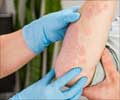Altered gut microbes worsen atopic dermatitis with triggers like allergens, pollution. Genetics affect susceptibility; treatments include diet, fecal transplants.

The Interaction between the Host Genome, Epigenome, and the Gut-Skin Axis Microbiome in Atopic Dermatitis
Go to source) Changes in gut microbiota composition can intensify the condition, alongside environmental triggers like allergens and pollution. Genetic variances link to susceptibility, while promising treatment strategies include dietary adjustments and fecal transplantation. Knowing how these factors correlate is fundamental to a better understanding of the disease and serves as a basis for novel therapies, according to a review article published in the International Journal of Molecular Sciences by researchers at the University of São Paulo (USP) and the Federal University de São Paulo (UNIFESP) in Brazil.
‘Changes in gut microbiome composition play a role in the development of atopic dermatitis. #eczema #dryskin’





Also known as atopic eczema, AD affects 7%-10% of adults and 20%-25% of young children. There is no consensus as to whether boys or girls are more affected. The number of cases has increased significantly in the twenty-first century. Scientists believe the rise is due to several factors, such as genetics, autoimmunity, impaired skin barrier integrity, viral infections, gut microbiome composition, dietary habits and lifestyle changes. A hypothesis that has been proposed to explain the significant increase in developing countries is lack of exposure to beneficial bacteria, which may affect immune maturation (the process by which the immune system develops a response after first contact with microorganisms).
The authors of the review, which was supported by FAPESP, show that gut microbiota is at the center of the most recent research. “Besides being responsible for 70% of immune system regularization, for maintaining skin barrier integrity and the structure of the gastrointestinal tract, and for controlling nutrient absorption and energy balance, the gut microbiome is directly connected to the skin via what’s known as the gut-skin axis,” said Sabri Saeed Sanabani, a researcher at the Institute of Tropical Medicine (IMT-USP) and last author of the article.
Studies have reported increased abundance of Clostridium difficile, Escherichia coli and Staphylococcus aureus, as well as decreased abundance of bacteria that produce short-chain fatty acid (SCFAs), such as Bifidobacteria and Bacteroides, in the gut microbiome of AD patients compared to healthy controls. A reduction in levels of SCFAs is often associated with intestinal inflammation in otherwise healthy subjects.
With regard to genetics, the latest research on the subject involves genome-wide association studies (GWAS), focusing on the identification of associations between genetic variants and important phenotypes, and has so far found several markers that correlate with susceptibility to AD and its progression, including mutations in the filaggrin gene (FLG) that are the most well-established risk factor for AD. Filaggrin (a portmanteau for filament aggregating protein) is a protein that binds to keratin fibers in epithelial cells. Whether gut microbiome alterations are genetically determined is unknown, however.
Advertisement
The review also covers promising therapeutic approaches, such as those targeting epigenetic alterations and modulation of changes to gut microbiome diversity via diet, probiotics and prebiotics, as well as fecal transplants.
Reference:
- The Interaction between the Host Genome, Epigenome, and the Gut–Skin Axis Microbiome in Atopic Dermatitis - (https://www.mdpi.com/1422-0067/24/18/14322)















